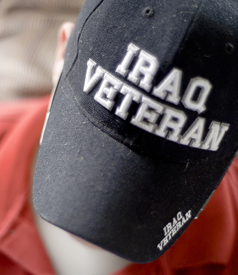Did you know that Truthout is a nonprofit and independently funded by readers like you? If you value what we do, please support our work with a donation.
More than 1,000 veterans in California under 35 died after returning home from Iraq and Afghanistan between 2005 and 2008 – three times as many California service members who were killed in conflict overseas, according to a recently published Bay Citizen report.
Investigative journalist Aaron Glantz studied the cases of Reuben Paul Santos, Alex Lowenstein and Elijah Warren to shed light on a growing trend among Afghanistan and Iraq veterans who have died through high-risk behavior and suicide after being discharged. In particular, veterans who returned home to California died through motorcycle and motor vehicle accidents and unintentional poisoning; in addition, veterans were two and a half times as likely to commit suicide as Californians of the same age who had not served in the military.
Glantz, who has reported on the Iraq and Afghanistan wars since 2005, decided to focus on veterans in California because “it’s important to look at our own community. [Santos] was this young man that was from a community that was literally right down the street. That’s how silent this epidemic is.”
Santos returned from the military to his home in Daly City in 2003. He attempted to battle depression with a variety of treatments, from poetry to video games and, eventually, turned to psychiatric treatment. But according to Glantz, a number of bureaucratic obstacles prevented Santos from receiving adequate treatment once he recognized that he needed health care for psychiatric trauma.
Currently, veterans receive five years of free health care following their discharge; when Santos left the military in 2003, veterans were only eligible for two years of free health care – and Santos did not begin to experience symptoms until three years at home.
Keep advertising-free journalism alive! Please support Truthout today.
Post-traumatic stress disorder (PTSD) and depression symptoms “don’t emerge right away,” Glantz said. When Santos did apply to for treatment at the US Department of Veteran Affairs (VA), Glantz said, he “got the runaround,” often being transferred among therapists and having to retell his experiences in the war over and over. According to the report, Santos enrolled in a study treating veterans with PTSD six months before his death; after nine weeks with the same therapist, Santos left the study, while his doctor rated him as having “no clinical anxiety at that time.”
Santos hung himself three months later. “He finally got treatment, but it was too late,” Glantz said. “Reuben’s death was preventable. He passed away six years after his return, so there were opportunities for the story to have had a different ending.”
Lowenstein and Warren never attempted to receive mental health before committing suicide in 2010 and 2008, respectively. According to the report, less than half of returning veterans register at VA facilities for mental health treatment. A 2008 Rand Corporation study found that only half of veterans who need care seek it, as many traumatized soldiers remain silent to conform to a longstanding Army taboo against mental health care.
“VA and DOD [Department of Defense] appear to have a policy for veterans called ‘Don’t look, don’t find,'” said Paul Sullivan, a Gulf War veteran and executive director of Veterans for Common Sense.
Since 2008, Glantz said, policies have slowly shifted in a positive direction for veterans. “Under President Obama, the amount of money spent on veterans has increased dramatically,” Glantz said. “Under President Bush, there was a real head-in-the-sand attitude. That’s begun to change.” But the VA has a lot of ground to cover to make up for lost time, he said. “We started so late in the game.”
Specifically, Glantz recommends that veterans receive automatic registration with the VA, rather than having to seek it out on their own after their mental health begins to deteriorate. “Santos, Warren and Lowenstein should all have been automatically enrolled in the VA when they left the military. They should not have to fight a democracy to get in the system.”
Overall, Glantz said, it is the VA and not the veterans that should uphold a standard of proactive behavior. “The VA needs to make themselves more friendly to these young men and help them come forward if they need help,” Glantz said. “Out of one million veterans, only half are turning up at the VA, which means the VA needs to do a better job of reaching out to them.”
A terrifying moment. We appeal for your support.
In the last weeks, we have witnessed an authoritarian assault on communities in Minnesota and across the nation.
The need for truthful, grassroots reporting is urgent at this cataclysmic historical moment. Yet, Trump-aligned billionaires and other allies have taken over many legacy media outlets — the culmination of a decades-long campaign to place control of the narrative into the hands of the political right.
We refuse to let Trump’s blatant propaganda machine go unchecked. Untethered to corporate ownership or advertisers, Truthout remains fearless in our reporting and our determination to use journalism as a tool for justice.
But we need your help just to fund our basic expenses. Over 80 percent of Truthout’s funding comes from small individual donations from our community of readers, and over a third of our total budget is supported by recurring monthly donors.
Truthout has launched a fundraiser to add 432 new monthly donors in the next 7 days. Whether you can make a small monthly donation or a larger one-time gift, Truthout only works with your support.
